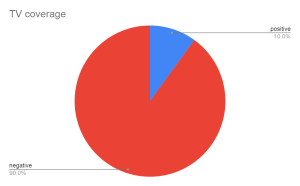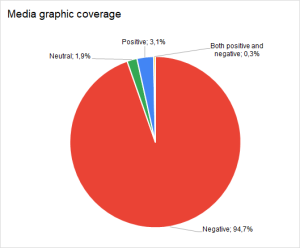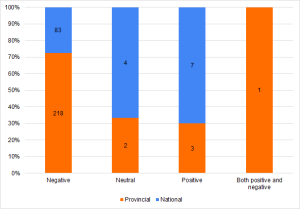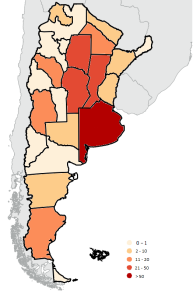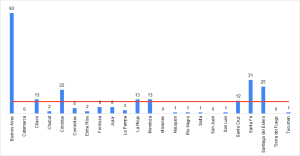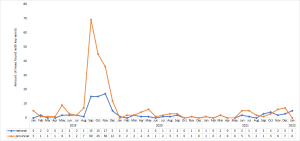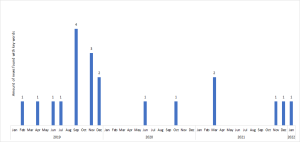Within the Americas region, Argentina was a pioneer in the regulation of trans fats. However, today there is an outdated with respect to the recommendations of international expert organizations. There is evidence of a need for improvement in order to protect the health of the population.
“Below, we offer a google translate version of the original article in Spanish. This translation may not be accurate but serves as a general presentation of the article. For more accurate information, please switch to the Spanish version of the website. In addition, feel free to directly contact in English the person mentioned at the bottom of this article with regards to this topic”
Trans fatty acids (TFA), or more commonly known as trans fats, can have a natural or artificial / industrial origin. Those of industrial origin are produced artificially by the food industry, through a process that receives the name of hydrogenation. That is, they are naturally liquid vegetable oils that turn into semisolid fats.
Because trans fats are an extremely useful product for the food industry, their use and consumption is much more frequent than you might imagine. This is due to its great stability against heat in frying, its great malleability for use in bakery and pastry products, due to the increased useful life of the products in which it is applied and due to its low cost. In addition, they give the final product a palatability that is difficult to achieve with any other fat source, thus increasing the desire for the consumption of these preparations.
However, the consumption of trans fats has serious consequences for health and no beneficial effect is recognized. According to WHO studies, they are an important factor in the generation of cardiovascular diseases and non-communicable chronic diseases. It is this context that determines the need and importance for States to develop and implement public policies aimed at eliminating the presence of TFA in the food supply, in order to guarantee the right to health and adequate food of their population.
Brief historical tour How do we get to the current regulations?
In our country, the regulatory framework for trans fats present in food products is established by the Argentine Food Code (CAA). Since 2008, after numerous international efforts aimed at demonstrating the relationship between the consumption of trans fatty acids (TFA) with severe health conditions and after demonstrating that the elimination of trans fats from food is feasible for the industry food, the World Health Organization (WHO) convened the formation of a working group that – in line with its purpose – received the name of “The Americas Free of Trans Fats.”
The objective of this working group was to determine procedures to gradually eliminate the presence of TFA from products, among which were regulatory measures, voluntary actions and the feasibility of recommending less harmful alternative fats. This is how the Declaration of Rio de Janeiro took place in 2008, which established a series of recommendations to be followed by the subscribing countries.
In this context, Argentina in 2010, established in the Food Code Art. 155 tris by which it was provided that the content of TFA from industrial production in edible designs should not be greater than 2% of the total fat in vegetable oils and margarines destined for direct consumption and 5% of the total fats in the rest of the products, excluding from these limits fats from ruminants and dairy products.
In this way, Argentina became one of the pioneer countries in the region by regulating the content of trans fats present in food, as well as making efforts to incorporate the parameters set by the WHO.
However, little by little the experience revealed the deficiencies in the formulation of these regulations. It gave rise to various interpretations that made the companies not strictly conform to the standards set and that the enforcement authority itself, ANMAT, adopted various criteria when demanding compliance. It was clear from the Article that the restriction of 2% of trans fats in vegetable oils and margarines, reached only those destined for direct consumption and not necessarily to margarines and oils used as raw material by the food industry, including the production of bakeries. , restaurants, hotels, fast food outlets, etc. For this reason, fats and oils with high concentrations of TFA were being sold and used as raw materials, without respecting the limits imposed.
Faced with this situation, in 2018, the National Food Commission (CONAL), proposed a modification to the regulation of trans fats that culminated in the modification of art. 155 tris of the CAA and the one that was published in the Official Gazette, just on January 21 of this year. The regulation in question was drafted as follows:
“The content of industrially produced trans fatty acids in food should not be greater than: 2% of the total fats in vegetable oils and margarines destined for direct consumption and 5% of the total of fats in the rest of the foods, including those that are used as ingredients and raw materials. These limits do not apply to fats from ruminants, including milk fat ”.
Disadvantages of current regulation
Despite recent modifications, the wording of the regulations continues to be deficient. Although one of its main motivations had been to include raw materials within the 2% limit, the truth is that far from providing clarity, it continues to give rise to different interpretations that guarantee that raw materials have the same limit as the rest of the food (5%) and not the maximum set for a margarine and oil for direct sale that would be its equivalent in domestic use (2%).
At the same time, in Argentina there are also certain shortcomings with regard to the monitoring and surveillance of products at the outlet. This situation is partly due to the fact that the inscription of edible products is merely declarative. Companies are not required to submit a laboratory analysis that confirms that what they declare is consistent with what the product actually contains. The obligation formally only applies to gluten-free foods and to the use of claims or complementary nutritional information on the labeling.
On the other hand, there is no established monitoring or surveillance plan that systematically analyzes chemically and nutritionally the content of the products, whether they are used as raw materials or are intended for direct consumption. The control carried out by the health authorities is only limited to verifying that the label complies with the established requirements.
Finally, it is important to note that although the Argentine State has been working since 2010 to reduce the presence of TFAs in the supply chain, the regulations suggest that, currently, there is an outdated status regarding the limits proposed by the organizations. international experts in the field. The WHO, after the launch of the REPLACE package of measures (2018) aimed at eliminating TFA from the food supply, in 2020 issued the so-called Action Plan to eliminate trans-fatty acids from industrial production 2020-2025, in order to to facilitate the implementation of policies and measures at the national level.
In both documents, the adoption of regulatory frameworks to eliminate or reduce the content of TFA to a maximum of 2% of the total fat content in all food products is highlighted as the first strategic action. In this sense, the States are called upon to make their efforts so that these policies can be approved and come into force no later than the end of 2023. Considering this step as the fundamental and the minimum floor that all Member States must ensure, regardless of your resource capacity.
Comparative experience shows that several high-income countries have practically eliminated trans fats from industrial production, either by imposing legal limits on the amount of these fats present in food, through the prohibition of partially hydrogenated oils. (main source of TFA from industrial production) or through a combination of these two strategies Research is conclusive in revealing that reducing or eliminating TFA from the food supply is both politically and technically feasible and that it is a relatively simple measure of low-cost, one-time, and significant long-term health benefits, especially in addressing and preventing Chronic Noncommunicable Diseases.
Along these lines, although the elimination of TFA is a strategy that would reduce the risk of these diseases for all people, regardless of their level of education or wealth, research shows that these measures have a greater impact on people. who habitually consume low-cost processed products and in those who face the greatest obstacles in accessing medicines and quality health care. For this reason, the WHO has expressly stated that, in order for the benefits to be distributed equitably throughout the world, it is necessary that measures be implemented in low- and middle-income countries, where controls on the use of trans fats of origin are often less stringent.
We urge the Argentine State to improve its current policies around the maximum concentration of TFA allowed in food products. The benefits in the use of this type of fats are only for the food industry that allows them to create highly addictive edibles at a very low cost. Research is categorical in stating that trans fats are extremely harmful to human health and are responsible for half a million deaths a year in the world. However, it has also been shown that the establishment of national limits through regulations is a feasible and effective measure that helps to improve people’s quality of life.
The right to health, adequate food, as well as the right to information within the framework of consumer relations, are fundamental rights that enjoy hierarchy and constitutional protection. Ensuring that food systems are safe, healthy and transparent for those who consume is the duty of the State and forms the basis for effective interventions in food policy and public health.
More information
Contact
Maga Merlo Vijarra, magamerlov@fundeps.org












